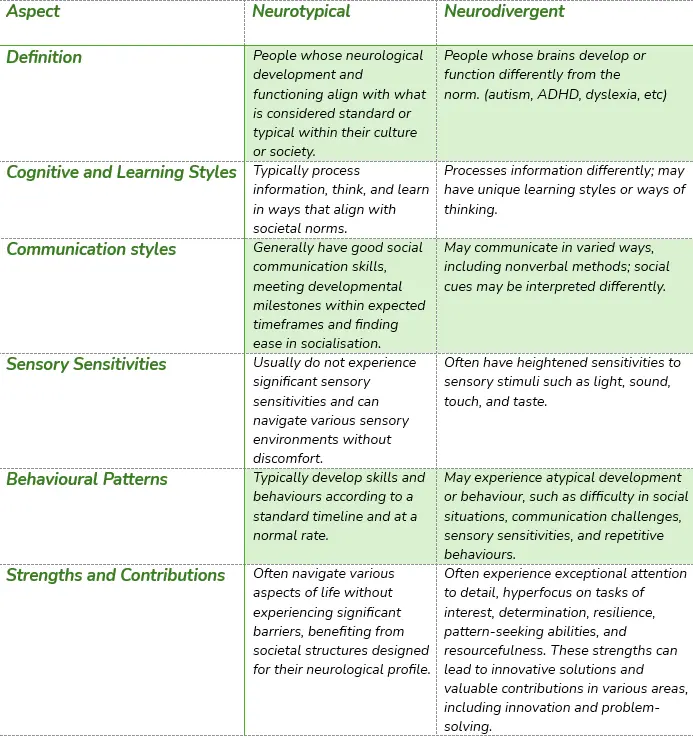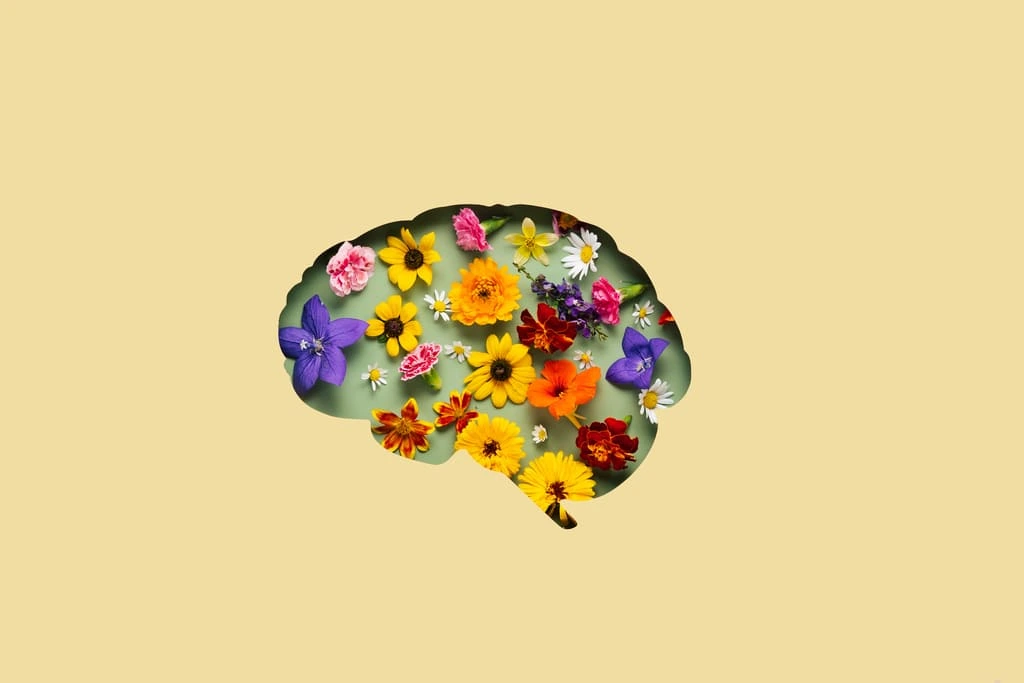Neurodiversity as a Concept
Neurodiversity is a concept that acknowledges and respects the natural variations in human brain function and behaviour.
The concept of neurodiversity was introduced by Judy Singer, an Australian sociologist and disability rights advocate, in the late 1990s. Emerging from the disability rights movement of the late 20th century, the neurodiversity movement took shape in the late 1980s and early 1990s with the establishment of Autism Network International. Since then, it has evolved to confront the stigma and discrimination experienced by people with neurological differences, advocating for a more inclusive society.
⇒ Read more about the concept of neurodiversity and how to create supportive environments for neurodivergent people.

Signs of Neurodiversity
Neurodiversity refers to the natural variations in human brain function and behaviour. Recognising the signs of neurodiversity can help support people who think, learn, and perceive the world differently. Embracing neurodiversity can lead to more innovative, empathetic, and inclusive societies where everyone has the opportunity to thrive.
A neurodivergent person can experience the following:
Unique Cognitive Processing
People who are neurodivergent often experience a wide range of cognitive abilities that differ from patterns that a neurotypical person has. These variations should not be viewed as deficiencies but rather as distinctive traits that enhance the richness of human diversity. For example, autistic people often excel in recognising patterns and logical thinking, whereas people with attention deficit hyperactivity disorder (ADHD) may show remarkable creativity and problem-solving abilities.
Hyperfocus is a characteristic often met in neurodivergent people, especially people with ADHD. They can sustain intense concentration, sometimes for long durations, when working on tasks that captivate their interest. Moreover, many neurodivergent individuals possess remarkable attention to detail and intense focus, frequently noticing subtle variations and patterns that may go unnoticed by others.
Other traits that neurodivergent people may experience as part of their unique cognitive processing spectrum are:
Unique learning styles – having unique learning styles means people who are neurodivergent may prefer different learning styles, like visual, auditory, or kinesthetic. For example, students with dyslexia may benefit from multisensory teaching methods and assistive technologies.
Exceptional memory and analytical skills – having a high capacity to memorise information and intense mental focus.
Pattern recognition and visuospatial thinking – helping them to excel in fields like engineering, mathematics, and arts.
Sensory Sensitivities
Sensory sensitivities are a significant aspect of neurodiversity, affecting how people perceive, process, and respond to sensory information from their environment. These sensitivities can manifest as either hypersensitivity (over-responsiveness) or hyposensitivity (under-responsiveness) to various sensory stimuli.
There are two types of sensory sensitivities:
Hypersensitivity – refers to an over-responsiveness to sensory stimuli, where everyday experiences can become overwhelming or even painful.
Hyposensitivity – refers to an under-responsiveness to sensory stimuli, where people require more intense sensory input to register sensations.
Sensory sensitivities can profoundly affect daily life, often presenting barriers to accessibility and impacting physical, emotional, and mental well-being. For instance, people with hypersensitivities may have challenges coping with specific environments, which can result in avoidance behaviours and increased social isolation.
We must start by creating inclusive environments to support the sensory needs of neurodiverse people, such as arranging furniture to provide safe and open spaces or using light covers. People deserve personalised care that reflects their unique needs. This can involve carefully made care plans to detect triggers, developing a sensory safety plan and implementing soothing strategies.
Also, establishing sensory-friendly spaces at home, school, or work can help people manage their sensory needs. At Leaf Complex Care’s Bristol office, we have a sensory room to meet the needs of neurodivergent people to minimise sensory overload and provide a safe space for relaxation and recharging throughout the day.
⇒ Read more about the 6 Effective Ways to Support and Empower Neurodivergent People.
Focus and Attention Patterns
Focus and attention patterns are key indicators of neurodiversity and can vary significantly from neurotypical norms, often leading to unique strengths and challenges. For example, people with ADHD may experience moments of intense hyperfocus, while in other situations, they may struggle with restlessness and concentration.
These patterns have an enormous impact on people’s lives daily in many walks of life. In educational settings, neurodivergent students may benefit from personalised learning plans that provide flexible study arrangements, quiet break spaces, or noise-cancelling headphones. The same goes for workplace environments; managing daily activities can be challenging due to attention patterns. Strategies such as setting reminders, visual schedules and breaking tasks into smaller steps can support people to improve their task completion and reduce feelings of overwhelm.
Atypical Social Behaviours
Atypical social behaviours can be a sign of neurodiversity, mostly recognised in Autism Spectrum Disorder, learning disabilities, and ADHD. These behaviours often differ from neurotypical social norms and can include challenges in social interactions and distinct ways of processing social cues.
Neurodivergent individuals frequently encounter difficulties with social communication, such as interpreting non-speaking cues, sustaining eye contact, and understanding social norms. For example, autistic people may prefer a solid adherence to rigid routines, repetitive movements, and an intense focus on particular subjects or objects. Additionally, if this is disrupted, it may cause distress, resulting in behaviours of concern or affect their social interactions.
Signs of Neurodiversity in Children
Neurodiversity in children recognises the way they process information differently and perceive and respond to the world in everyday life. The impact is reflected in their daily activities, interests and hobbies they love to explore, school settings, and everyday social relationships. Many children experience social anxiety and feelings of isolation just because their brain works differently. The constant fear of being ‘not good enough’ can lead to social anxiety and many other associated anxieties and related mental health issues. As a society, we must do better and raise awareness about neurodiversity and the importance of acceptance.
The most common signs of neurodiverse children are:

- Social challenges
- Difficulty communicating
- Repetitive behaviours and interests
- Sensory sensitivities
- Focus and attention variability
- Learning challenges
- Motor skill difficulties
- Preference for routine and resistance to change
- Innovative and creative thinking
It is essential to seek professional help to obtain a personalised support plan. Early intervention can greatly enhance outcomes for neurodivergent children, aiding them in developing crucial skills and coping strategies. The support of an in-house multidisciplinary team, skilled support workers, and mental health professionals will enhance and embrace a child’s strengths, encourage them to pursue their passions and boost self-esteem and sense of identity.
⇒ Learn more about embracing and supporting personal differences in neurodiverse children.
Signs of Neurodiversity in Adults
In the United Kingdom, more than 15% of adults identify as neurodivergent, including a variety of neurological differences, including autism, ADHD, dyslexia, and others. Despite this large proportion of the population, many workplaces continue to cater predominantly to neurotypical people, frequently failing to recognise the unique strengths and valuable contributions that neurodivergent employees can offer.
The key signs of neurodiversity in adults are:
Communication difficulties
Sensory sensitivities
Nonlinear thinking
High levels of focus
Daydreaming
Insomnia
Social challenges
Stimming
Difficulty with transitions
Deep and passionate interests
Executive function challenges
Leaf Complex Care’s support workers and therapy team are highly trained in Neurodiversity Support. They can support people to live on their own terms, teaching them life skills and reducing behavioural challenges.
To get to know all about their expertise and skills.
Neurotypical vs. Neurodivergent
In the United Kingdom, neurodiversity is a broad and important aspect of society, with a minimum of 15% of adults recognised as neurodivergent. Recognising the differences between neurotypical and neurodivergent people is essential for promoting inclusivity and tapping into the distinctive strengths that neurodivergent people offer in various environments, including the workplace. By embracing neurodiversity, we can unlock greater creativity, innovative thinking, and new perspectives.

Leaf Complex Care Supports Neurodivergent People
Leaf Complex Care offers personalised support primarily for autistic people, people with a learning disability, and people who require complex care, ensuring that care is provided in the comfort of their own homes. This approach meets each person’s unique needs, promoting security and familiarity. The care provided is regulated by the Care Quality Commission (CQC). It’s based on Positive Behaviour Support (PBS) approaches, which encourage people to achieve their aspirations with the right support at home.
Therapeutic Interventions
The in-house therapists at Leaf Complex Care use communication methods that suit each person, fostering trust and enabling the right support. These person-centred therapeutic interventions aim to impact people through tailored therapeutic practices. We also provide specialist support in PBS, Occupational Therapy and Speech and Language Therapy, focusing on creating person-centred support practices and applying well-being models such as the PERMA model and Capable Environments.
Continuous and Evolving Support
Recognising the evolving nature of each person’s needs, Leaf Complex Care ensures consistency by providing continuous support to families and high-quality care through their support workers. This approach includes innovative support through therapy specialists, ensuring that care is adapted to people’s changing needs.
Download the case studies and see how our person-centred care brings positive change and empowers individuals to be as independent as possible in the community and their own homes.
Building Social Networks and Community Integration
Our care teams and support workers form a network around people, providing social care and support to build social networks, encouraging people to live fulfilled lives in their own homes and communities, and putting them at the centre of their care. By working with Integrated Commissioning Boards and Local Authorities across the UK, Leaf Complex Care designs and implements bespoke support.
Visit our offices in Bristol, South East, Birmingham and Somerset for additional information, or contact us today.

